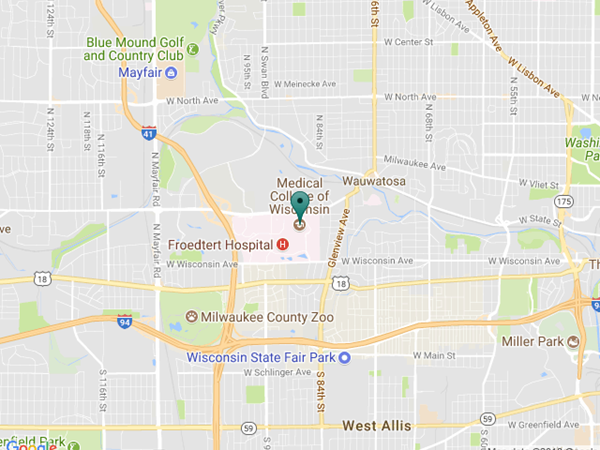Medical College of Wisconsin Neurodevelopmental Disorders Psychiatry Specialty Clinic (NDPSC)

Mission
Vision
About the NDPSC Clinic
Stabilization model
Visit expectations
Clinic set up
The clinic meets Thursday between 1 and 6 p.m. and is located at the Tosa Health Center at:
1155 North Mayfair Rd.
Milwaukee, WI 53226
The NDPSC has a pool of nurses and medical assistants that assist in addressing issues that occur between appointments.
Statement for NDPSC Patients
Goals for NDPSC Patients
- Promote a patient's sense of independence, freedom, and self-determination, to improve your quality of life, and to assist them in addressing any developmental tasks
- Determine the best way to understand patient concerns or symptoms, clarify if they have a psychiatric disorder, and offer safe and effective treatment options including levels of care and alternatives to treatment
- Educate patients about any current disorders so that they can make the most informed decisions for themselves regarding their care and treatment. Patients are the decision maker in their treatment; Dr. O'Grady and staff are here to help inform your decision making
Testimonials from our NDPSC Patients
"Dr. O'Grady was very thorough and compassionate. Also clearly explained our son's condition to us. We were not expecting such a long in-depth visit and were very pleased with it. We were also happy to get in to see Dr. O'Grady so quickly, although the follow-up visit is later than we had expected or that the doctor had recommended."
"Dr. O'Grady is our main provider for our daughter's complicated condition and he does help us navigate the changes in her behavior and physical symptoms."
"Dr. O'Grady helped us solve a family controversy about how to restart an antipsychotic medication and proceed with efforts of weight loss. He always gives us choices and explains rationale and possible benefits and side effects, what to watch for. I asked our daughter with Down syndrome what was her best part of the day and she responded 'O'Grady."
"Dr. O'Grady is kind, caring and very easy to work with. He has great suggestions and is in general, a very skilled practitioner. He bends over backwards to help his patients. Thank you!"
About Neurodevelopmental Disorders
Resources

-
AAIDD
The American Association on Intellectual and Developmental Disabilities is the oldest and largest interdisciplinary membership organization of professionals and others concerned about intellectual and developmental disabilities. Founded in 1876, it has educational materials and trainings helpful for families and community service providers.
Learn More -
American Academy of Child and Adolescent Psychiatry
This is an association of over 10,000 practicing psychiatrists, psychiatry residents, medical students and other mental health professionals focusing on diagnosing and treating mental disorders in children and adolescents including neurodevelopmental disorders. The website includes information on educational resources, best practices, family and youth information, and advocacy.
Learn More -
American Academy of Pediatrics
This is an association of over 67,000 pediatricians with a focus on diagnosing and treating medical and developmental disorders in children and adolescents. The website includes information on patient care, research activities, advocacy, and policies.
Learn More -
American Psychiatric Association
This is an association of over 38,000 practicing psychiatrists, psychiatry residents, and medical students focused on diagnosis and treatment of mental disorders, including neurodevelopmental disorders. The website includes information on education, advocacy, policies, best practices, and publications.
Learn More -
ASSW
Autism Society of Southeast Wisconsin is a local resource with educational and therapeutic resources for persons and families regarding Autistic Spectrum Disorders.
Learn More -
Center for Disease Control and Prevention
The National Center for Birth Defects and Developmental Disabilities is a federally funded organization with a focus on identifying and treating developmental disorders.
Learn More -
Children's Wisconsin Down Syndrome Program
The Down Syndrome Program based at Children’s Wisconsin is an excellent resource to address clinical concerns, offering information and consultation for families and primary care providers.
Learn More -
NORD
The National Organization for Rare Diseases is a good resource for information regarding neurogenetic developmental disorders.
Learn More -
Waisman Center
The Waisman Center is a federally supported organization located in Madison Wisconsin, affiliated with the University Of Wisconsin, with information resources, clinical services, research activities, and professional training with a focus on neurodevelopmental disorders.
Learn More -
Wisconsin Department of Health Services
This is the state organization which oversees health services in Wisconsin. The website includes information on long-term-care and supports (including adult developmental disability services), health care and coverage (including services for children with disabilities), and certification, licenses, and permit information for service providers.
Learn More -
University of Minnesota Masonic Institute for the Developing Brain
This is a multidisciplinary Center at the University of Minnesota with a focus on clinical services and research on neurodevelopmental disabilities.
Learn More
Meet the Team
Joseph O’Grady Jr., MD, is an associate professor of psychiatry and behavioral medicine at the Medical College of Wisconsin. He is the Director of the MCW Neurodevelopmental Disorders Psychiatry Specialty Clinic at the Tosa Health Center.

Joseph P. O'Grady, MD
Associate Professor
NDPSC Nursing Team
NDPSC Administrative Support Team
Contact the NDPSC Clinic
Please contact the clinic with questions or to schedule an appointment.
1155 N. Mayfair Rd.
Milwaukee, WI 53226




